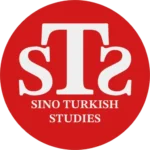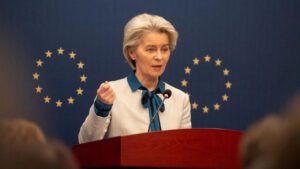Donald Trump’s Middle East visit, breaking the usual tradition of newly elected US leaders visiting NATO or European countries, poses a significant risk to China’s regional influence and geopolitical interests in the Middle East. These interests are crucial to the region’s economic landscape and geopolitical stability.
The trillion-dollar defense, artificial intelligence, and tech deals signed during the visit are more than just lucrative contracts—they signal a renewed US strategic engagement in the Middle East. Trump stated: “Biden abandoned these countries and they turned to China. Now we are reversing this situation.”
How does China view Trump’s visit?
According to the People’s Daily, the official newspaper of the Chinese Communist Party (CPC), the visit marks a “US comeback” and indicates a broader geopolitical strategy. The May 17 commentary asserted: “Trump’s visit aims to fill the power vacuum left by the Biden administration. But this vacuum is now filled not only by the US but also by China’s expanding influence.”
China, aware of Trump’s tactics, is striving to present itself as a confident global actor. In response to Trump’s remarks that the US is “winning back countries that turned to China,” Chinese Foreign Ministry spokesperson Lin Jian noted:
“Middle Eastern countries have the right to make independent and sovereign decisions. China supports both the economic and political independence of these countries.”
‘China must take responsibility’
Beijing understands that Gulf countries like Saudi Arabia, UAE, and Qatar do not want to pick sides. These states seek military technology and financial support from the US, while expecting infrastructure investment and non-interference policies from China, along with stable energy cooperation.
China is already the largest trading partner of the Gulf states, with bilateral trade exceeding $400 billion in the previous year. It is also the top oil importer from the region. Chinese electric vehicles, as well as apps like TikTok and DeepSeek, are increasingly common among Arab youth. Meanwhile, more direct flights now connect Gulf cities to Beijing and Shanghai, indicating China’s growing soft power.
However, some in China suggest that Trump’s Middle East trip should lead to a strategic policy adjustment. According to a Xinhua editorial published May 18:
“China’s presence in the Middle East promotes development, not hegemony. But Beijing’s long-term strategy faces threats from emerging military and economic alliances.”
In China Affairs Plus, analysts argued:
“If China continues its passive diplomacy, it risks losing ground to Washington’s aggressive Middle East strategy. China must match economic engagement with political risk-taking capability.”
Reconceptualizing China’s Middle East policy
Although the US-Gulf rapprochement does not mean direct confrontation between China and Arab nations, Trump’s return to the Middle East should be a wake-up call for Beijing’s policymakers. In this new era, strategic clarity and tangible partnerships are essential.
One of the visit’s turning points was the lifting of sanctions on Syria’s transitional government and Trump’s meeting with Syrian President Ahmed al-Sharaa. This move reshapes regional power dynamics, forcing China to reconsider its long-held Syria policy. While China supports a political solution in Syria, US re-engagement limits Beijing’s diplomatic and economic maneuverability in the country.
Despite its economic footprint, China remains limited by its tendency to focus only on development and trade. However, the Middle East’s complex political and security issues require more proactive Chinese diplomacy. As Arab leaders prioritize national interests, the US alliance offers military guarantees and political flexibility—elements China’s infrastructure-focused diplomacy alone cannot fulfill.
💡 Keywords
- Trump Middle East visit
- China Middle East strategy
- US-China Gulf rivalry
- geopolitical clash
- China soft power
- Chinese economic influence
- Saudi Arabia, UAE, Qatar
- Syria sanctions
- Trump foreign policy
- Beijing Middle East diplomacy
Abroad Africa AI Beijing Belt & Road BLCU BRICS China chinese CPC CSC Culture Economy education EU Guizhou Kültür Langauge movie Multipolarity Russia scholarship science Shanghai Sino Sino Turkish Sino Turkish Sino Turkish Sino Turkish Sino Turkish Studies Sino Turkish Studies Sino Turkish Studies Sino Turkish Studies space Syria Taiwan Tariff trump Turkiye Türkiye University USA Xinjiang ZJUT Çin





